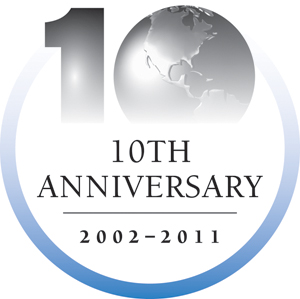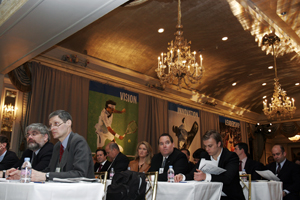 |
SHANA WITTENWYLER
World Congress returned to The Pierre in New York City in 2007. |
The 2007 installment of World Congress returned to The Pierre in New York City. The event featured a one-on-one interview with MLB Commissioner Bud Selig, who covered everything from the league’s challenges with steroids to the possible sale of the Chicago Cubs.Participants continued to adjust to the brave new world of social media, looked at the growing role they expected China would play in the global sports landscape, and speculated on what the future could hold for sports on cable.
 |
SHANA WITTENWYLER
Mark Waller (left) and Mark Tatum discuss China’s growing economic stature. |
Focused on China
A year away from the Beijing Olympics, panelists were bullish on the Chinese market.
“You are seeing Chinese brands that are going to become global brands very fast,” said Mark Tatum, then senior vice president of marketing partnerships with the NBA.
“Sport will be a key vehicle for those Chinese companies to become a global brand,” said Formula One adviser Michael Payne. “They’ve seen it in how the Japanese have done it with soccer, how the Koreans have done it in the last decade, and now they’re doing the same.”
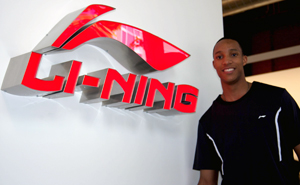 |
PR NEWSWIRE
|
Payne later said, “I will wager in 10 years time there will be a dozen household Chinese brands in the U.S. and in Europe.”
Some of those brands most active of late have included apparel brand Li Ning, computer maker Lenovo and appliance maker Haier.
When the discussion shifted to Chinese athletes, Mark Waller, then senior vice president, international, for the NFL, said the league was training three Chinese men to kick field goals in hopes that one might be able to play in the league’s exhibition game in China, planned for the following year.
“Their accuracy is now pretty good. The issue they will struggle with is just the pressure,” Waller said. “And imagine being the first Chinese person to kick nationally on China TV in the first game in China. … That’s pressure.”
Alas, the NFL scrapped plans for the game in China, so those players never got their shot.
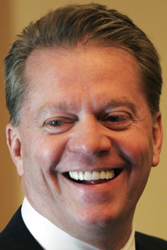 |
| Checketts |
Being social
As panelists debated the headlines of the day, they were asked to describe the impact of social networking.
“This creation of communities and the discussion that takes place is the language of a new America,” said SCP Worldwide’s
Dave Checketts.
“We are a content company trying to figure out how to deal with a generation who doesn’t understand what they’re putting up,” said ESPN’s John Skipper.
Skipper said his son “made the mistake” of posting spring break pictures online and then being in the same room as his mother. Skipper said to him, “Don’t you understand? You don’t want to be famous with your mother.”
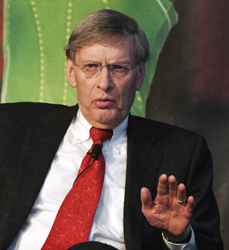 |
SHANA WITTENWYLER
During a one-on-one interview, the MLB commissioner hinted at retirement, but he would later put those plans on hold. |
Selig speaks: Retirement, Cubs and Bonds
MLB Commissioner Bud Selig covered a lot of ground during a one-on-one interview.
• On his retirement plans: “In 2009, I’m going to be 75 and I do want to teach and write a book. Even in Monopoly you get a ‘get out of jail free’ card, and I’m going to use mine.” Selig, however, renewed his contract and now says he doesn’t plan to retire until after the 2012 season.
• On whether Tribune Co. was selling the Chicago Cubs: “At this moment, they insist the team is not for sale. … If and when the Cubs are for sale, there are a lot of groups in Chicago wanting to buy it.” The Ricketts family bought the club two years later for $845 million.
• On efforts to get a new stadium for the Florida Marlins: “You learn to have patience in these situations. … Mr. (Bob) DuPuy’s going down there for his 200th trip tonight. I’m optimistic but there are things yet to confront.” The Marlins pulled together a deal for a new stadium, which will open in Miami in 2012.
• On celebrating Barry Bonds’ record home run: “We’ll take care of that if and when Barry breaks the record and we’ll handle it the way we do any record. Like in every other decision you make as a commissioner, you can’t let your feelings get in the way.” Bonds broke the record that season, and Selig called to congratulate him.
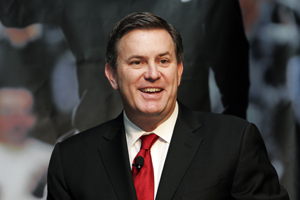 |
SHANA WITTENWYLER
Tim Leiweke. |
Global ambitions
AEG President and CEO Tim Leiweke identified Berlin, London, New York, Los Angeles and Shanghai as key markets to AEG’s future growth.
“I think you’re going to see the true globalization of sports as we know it in the next five years, and I think the U.S. is going to lead the way for many of those sports, in particular basketball and hockey.”
Stateside, AEG currently is pitching the concept of a football stadium adjacent to Staples Center in Los Angeles. Overseas, the company partnered with the NBA to develop an arena in Shanghai, and also operates an arena in Beijing. The company now operates in five continents.
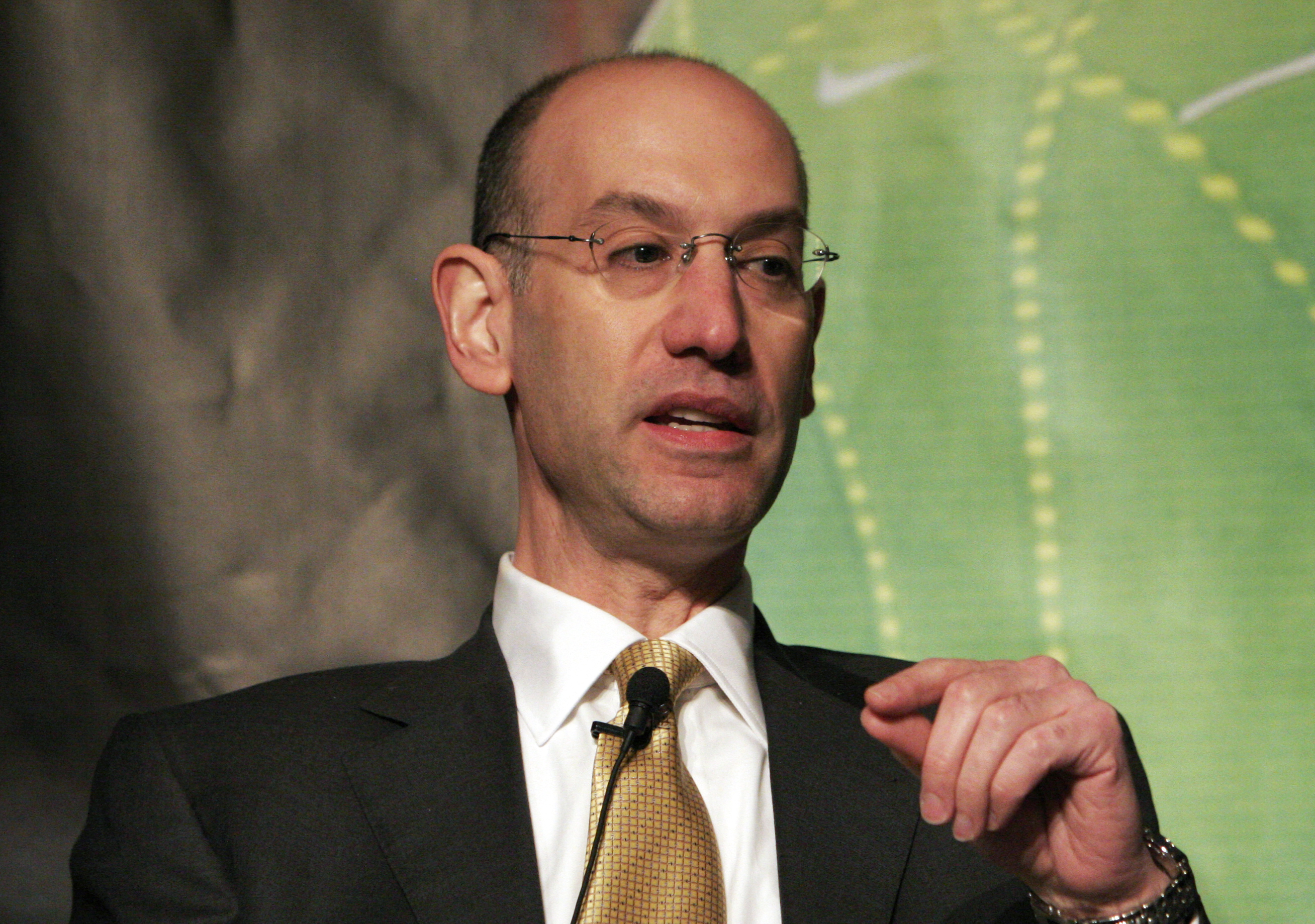 |
SHANA WITTENWYLER
Adam Silver |
Thoughts on sports tiers
While addressing the future of sports on television, NBA Deputy Commissioner Adam Silver was asked if the league was happy to have NBA TV on a sports tier.
“We embraced the sports tier, but we subsequently became disappointed with the amount of support cable operators have given to the sports tiers,” Silver said. “But eventually [the issue] will become irrelevant, and it will come down to what they pay us.”
Randy Freer, then president and COO of Fox Regional Sports Networks, said tiers “will be successful when cable decides it’s more important, or as important, to market as their broadband service.”
Future focus: Content and cell phones
Participants on one panel were asked about the next big thing in sports and entertainment.
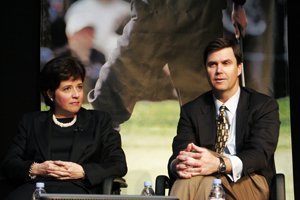 |
SHANA WITTENWYLER
Charles Schwab’s Becky Saeger and Visa’s Michael Lynch discuss keeping pace with evolving consumer demands. |
• Next silver bullet for marketers:
Michael Lynch, then senior vice president of partnership marketing with Visa, said the company was “trying to create our own content as opposed to sponsoring content.” He cited an online game created around the 2006 Turin Games.
• Cell phone advertising: “We have to be where [consumers] want to be,” said Becky Saeger, vice president and chief marketing officer with Charles Schwab. “We’re gonna find a way to do it, and it’s gonna happen fast.”
• Cell phones eventually being used as payment devices: Lynch said, “It’s inevitable — it’s the remote control of the future.”
A Beckham boost
 |
GETTY IMAGES
|
Audience members were asked: What will be David Beckham’s impact on Major League Soccer?
Major impact 34 percent
Marginal impact 59 percent
No impact 7 percent
The soccer star played his first games with the Los Angeles Galaxy in 2007. While he had a marginal effect on ratings and attendance, his presence may have had a greater impact in boosting investor interest in the league.
Super Bowl predictions
 |
GETTY IMAGES
|
Audience members were asked:
• What will a Super Bowl ticket cost in 2012? The 2007 price was $600. About 77 percent of the audience believed the price would be at least $1,000, 23 percent said $800. Face value for tickets at the 2011 Super Bowl were $600 to $1,200.
• What will a 30-second spot on the Super Bowl cost in 2012? The most popular answer among the audience was $2.9 million to $3.1 million, which garnered 42 percent of the votes. NBC is testing to see if it can command as much as $3.5 million for a 30-second spot during the 2012 Super Bowl.


